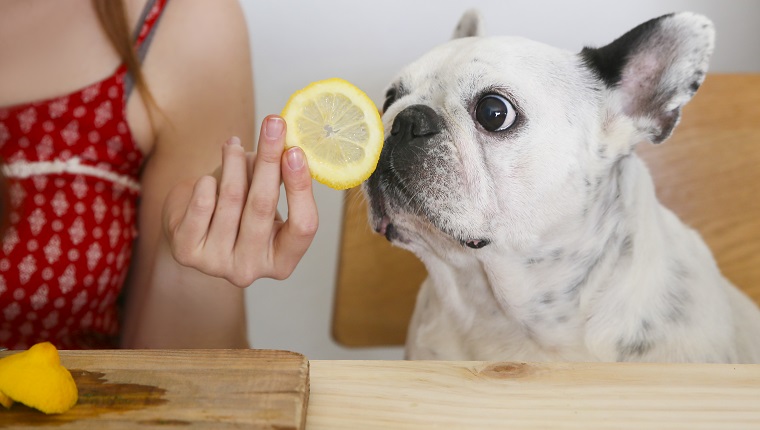While lemons are an exceptionally useful and nutritious fruit in many regards, straight-up eating one is rarely preferred by humans or canines. But the question here is about the safety. Can dogs eat lemons? Are they safe for our dogs to consume?
Technically, the short answer is yes, but our recommendation is no; the citric acid level in lemons causes stomach upset much too often. Oranges provide similar nutrition and are a much safer — and tastier — option for your dog.
That said, you must always run foods you might want to add to your dog’s diet by your veterinarian. They are always your most reliable source of information.
Why Are Lemons Bad For Dogs?
Technically, in moderation, a bit of lemon flesh is okay for dogs to consume. That is to say, it isn’t toxic for them to consume it in small quantities.
However, it’s highly unlikely that your dog will want to consume lemon. Their evolutionary response to citric acid and essential oils makes it highly undesirable for them. Dogs associate bitter foods with rancid or rotten food and naturally will usually steer clear.
Lemons do, however, contain vitamins that should be part of your dog’s diet. Things like potassium, fiber, and calcium are wonderful for your dog. But you just don’t need lemon to provide them these benefits.
Oranges are far superior to lemons in both taste and nutrition. In moderation, they are completely safe, and dogs often love them. Just don’t feed them the peel of the orange, as they do contain essential oils that cause stomach upset in dogs.
What Should I Do If My Dog Eats A Lemon?
If your dog eats a bit of lemon flesh, there isn’t much cause for concern. If they eat an entire lemon, minus the peel, even then everything will probably be okay. You would just want to monitor them for allergic reaction or stomach upset.
Now, if your dog were to get into a whole lemon, with the peel, a phone call to your vet is a good idea. Lemon peels have a high concentration of essential oils and a plant compound known as psoralen. When a large amount is consumed, it can be toxic.
Again, the worst part of lemon for your dog is the peel. If your dog laps up a bit of spilled lemon juice, they will be just fine. If they drink a large amount of lemon juice, which is unlikely, you’d want to give the vet a call.
As a general rule, keep lemons stored up high and away from your dog to keep the chances of curious and accidental eating to a minimum. Even minor poisoning can put a dog through significant gastrointestinal distress.
If an incident should occur, your veterinarian will instruct you over the phone about what to do.
Has your dog ever had an upset stomach after eating a bit of lemon? Is your dog one of the rare ones who enjoy the taste of this fruit? Let us know in the comments below.





